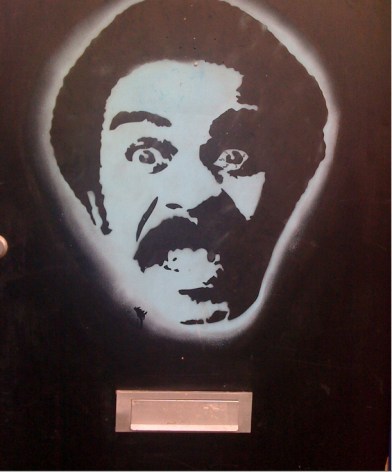

Being utterly besotted with the web, and especially the social web, as I am, I tend dislike nay-saying about its significance, and the manifold benefits this thing will bring to society, the world etc. You know the sort of Daily Fail nonsense: Facebook gives you cancer, Twitter rots your brain, bloggers never meet real people.
But there’s a difference between reactionary nonsense and thoughtful critiques. Over at the O’Reilly Radar blog, Joshua-Michéle Ross has been poking at some of the more troublesome prospects that social technologies bring. Like how much of our identity and personal data are we surrendering for analysis by corporations and governments (since analysis of that data is a big part of my business, but I also value personal freedom that’s a particularly interesting issue for me).
He takes through a series of four posts that I highly recommend reading:
- The Evangelist Fallacy, Social Media and The New Age of Enlightenment: In which we are reminded that the Enlightenment with which we draw so many parallels to today brought not just progressive new ideas about equality and rights, but new (very effective) thinking about how to control the massses.
- The Captivity of the Commons: With the whole world connected and people living their lives in public we need to re-think privacy and how corporations work (so that they are less amoral).
- The Digital Panopticon: How the nightmare of the Panopticon is effectively at hand if corporations are able to see every detail of our livs in plain sight.
- Social Science Moves from Academia to the Corporation: Funding for social sciences will increasingly come from corporations as they try to understand how to manipulate mass social media.
As Alan Patrick says on Broadstuff:
hat makes this post extremely fascinating is that it comes from the O’Reilly Radar, which – in my experience anyway – have tended to be on the “cup overfloweth” side of the New New Social Thing, never mind a Glass Half Full – so this Glass Half Empty article – the first, it seems, of a series, is a rather fascinating shift of tenor, methinks.
He senses the beginning of a backlash, good and proper, perhaps coming from businesses (that aren’t managing to figure out how to get value out of networks as fast as Joshua-Michéle fears) as well as individuals wanting to rein in how much web shadow they are comfortable casting.
Meanwhile, Ian Delaney has a melancholy reflection on this subject that makes for good further reading and thinking matter, about how his early hopes that social media would bring socialist values to the fore are fading. He picks up the Panopticon analogy and extends it to society.
philosopher Michel Foucault back in the 70s picked up and ran with the idea of the Panopticon, especially in his best-known work Discipline and Punish. His idea was that Bentham’s model wasn’t just an idea for a prison; but for a society.
He argued that prisons are a really new idea. Back in the past, we simply thrashed/burned/drowned/stabbed transgressors. That all changed in the C18th with the Enlightenment . The idea of law-enforcement was ‘enlightened’ with the understanding that resources [people] didn’t need to be wasted and that better social control is exercised through freely-given compliance, rather than co-option.
People could be turned into machines, a consequence of political thinking in the emergence of industrial society and the rush to efficiency and cost-allocation. Once properly mechanised, they could be ‘trusted’ – the scare quotes, because the trusted prisoner is no longer human. A big part of that process is surveillance: once people know that they are always (potentially) watched, they’re a bit more compliant to the rules, and a bit more like machines.
Actually, Ian turns from melancholy to fighting talk. Where is the transgression, he asks? What passes for subversion online is often just prnaksterism, often funded to, in small feats of legerdemain to slip in a flash of brand in front of the viewer.
The echo chamber is another danger in all of this, Ian says. Where are the racists in his network?:
Racists are poised to take Stoke in the next by-election. They don’t appear on my spectrum because I have deliberately blinded myself to their existence on a day-to-day basis. Diversity of opinion is purely opt-in (with strong incentives to opt-out) in socialmediaworld.
Add some racists to your feed list? I don’t know about racists, but I enjoy having different views on hand in my inbox. I detest a great deal of what some political bloggers say, but I like to try and understand. Sometimes I have had my mind changed too. I understand people on the right (OK, mainly the centre right) much better than I did when I was a pre-web student. Then I used to sneer at people for reading the Telegraph for goodness sake. Now I’ll read it’s leaders and blog posts alongside Comment is Free and the Guardian.
I’ll unsubscribe because people are boring, not because I disagree. Maybe that’s just me. And maybe I need to listen more to some Green voices, some far right voices, some Socialist Workers Party voices.
All is not lost, I say. Fight on…This world is still ours to shape, perhaps as never before. We’re right to identify these pitfalls and blind alleys, but nothing is inevitable in all of this. There’s still a revolution to be had.
After we’ve read these warnings, go and read some Umair Haque manifesto. Then think about what you will do this year to change the world. Seriously.
Point is: there’s a lot at stake.
Leave a Reply
You must be logged in to post a comment.